 The number of police departments across the country that are equipping their officers with body cameras continues to increase exponentially. The biggest problem with this is that despite the rapid growth in use, the vast majority of these departments have little in the way of laws on the books regarding their use. States like North Carolina do have laws in place that are designed to prevent members of the public from seeing any footage captured by body cameras unless they have a court order. This new law does provide a number of exceptions that would allow anyone who is captured on film to access it, but at the same time, there is a huge list of exceptions that would continue to prevent members of the public from seeing the footage. That is unless they can afford the costly legal fees.
The number of police departments across the country that are equipping their officers with body cameras continues to increase exponentially. The biggest problem with this is that despite the rapid growth in use, the vast majority of these departments have little in the way of laws on the books regarding their use. States like North Carolina do have laws in place that are designed to prevent members of the public from seeing any footage captured by body cameras unless they have a court order. This new law does provide a number of exceptions that would allow anyone who is captured on film to access it, but at the same time, there is a huge list of exceptions that would continue to prevent members of the public from seeing the footage. That is unless they can afford the costly legal fees.
A Nationwide Issue
This situation is one that is affected police departments across the country as they continue to struggle with finding the best possible way to cope with such an enormous influx of new evidence. The big question concerns whether or not any footage captured by body cameras should be treated like any other evidence. Alternatively, should the footage be considered as something unique that does, in fact, require new laws such as the one in North Carolina?
The question is at the center of a huge nationwide debate as not only can this type of footage provide the evidence needed to ensure a conviction, but in many cases, it also includes images of people or places that are not actively involved in the investigation or crime. As such, capturing this information and making it accessible to members of the public, could, in fact, be considered a breach of their privacy covered under a number of existing laws.
Privacy Is Key
It is only to be expected that the use of police body cameras would indeed pose a risk to the public’s right to expect privacy. Such footage is indeed capable of providing law enforcement officers and the courts with undeniable evidence of what happened during an interaction between officers and the public. However, there are those in the courts and law enforcement who seem to feel as though the public does not have a right to see it.
If you were to ask virtually any police department if they believe they should have control over who gets to see this footage, the answer would, of course, be a very firm yes. The feeling among individual officers may be slightly different as they see the footage as a way to prove that they were, in fact, behaving in a manner consummate with proper behavior and that they were in the fact right. At the same time, failing to release the footage to the public is likely to cause them to trust law enforcement officers less now than at any time in the past. In turn, this is likely to lead to even more threats against officers rather than less as was hoped with the introduction of police body cams.
